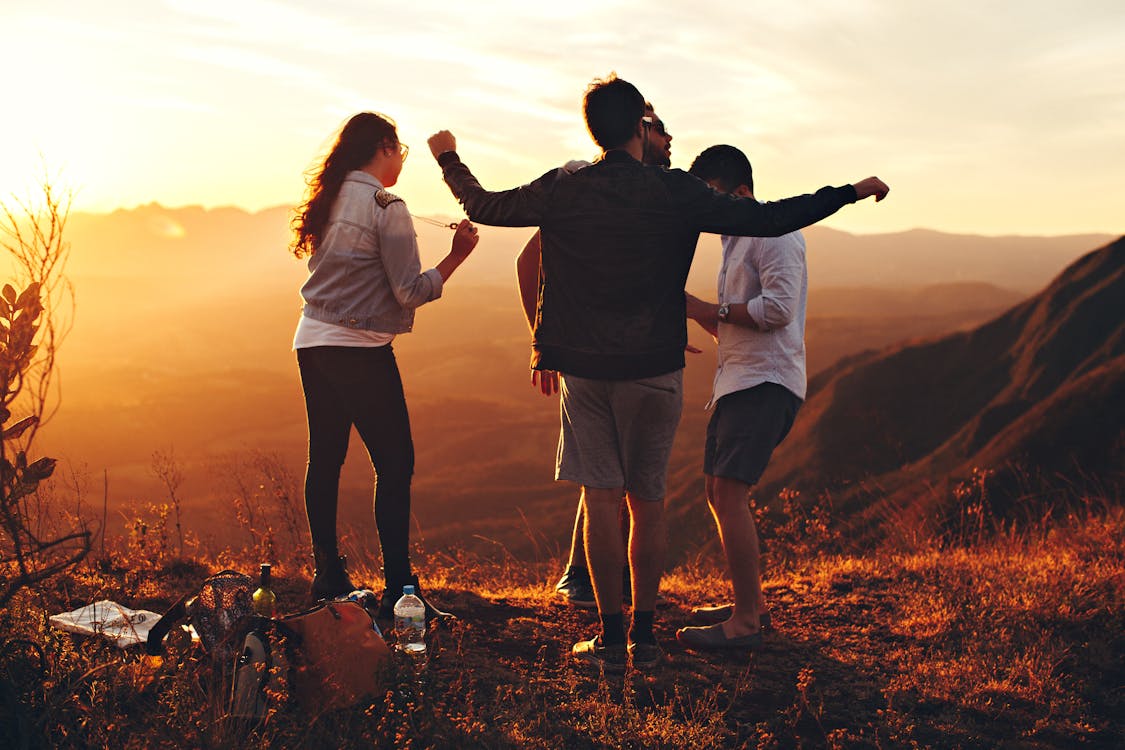7 Secrets to Healthier, Happier Life From the World’s Longest-Lived Communities

Life today often feels rushed and overwhelming, with diet-related health issues on the rise and many struggling to maintain balance and vitality. Yet, in certain corners of the world, small communities have unlocked the secret to living long, happy, and healthy lives. Dan Buettner’s documentary, Live to 100: Secrets of the Blue Zones, shines a light on their extraordinary lifestyles.
In places like Okinawa, Japan, and Sardinia, Italy, people not only live well into their 90s and 100s but do so with remarkable health and joy. They embrace simple routines, strong social connections, and a sense of purpose that fuels their well-being. While replicating their way of life entirely may not be realistic for everyone, their habits offer valuable insights. These lessons provide practical and powerful ways to improve both health and happiness, no matter where life is lived.
What makes these communities so unique? And how can these principles be applied to everyday life? Exploring their approach reveals timeless strategies for creating a healthier, more fulfilling existence.
1. Move with Purpose
Staying active doesn’t always mean hitting the gym. The longest-lived communities show that movement can be seamlessly woven into daily life. Dan Buettner emphasizes the value of functional activities, such as tending a backyard garden. This simple practice not only provides fresh produce but also encourages regular movement through tasks like planting, weeding, and harvesting. It’s a natural and rewarding way to stay active without the need for fitness equipment.
Another powerful habit comes from Okinawa, where sitting on the floor is a common practice. This simple tradition requires frequent transitions from sitting to standing, which engages the legs, core, and balance. Buettner recounts observing a 104-year-old woman standing up from the floor 30 times in two days—a movement comparable to performing squats. This not only builds strength but also reduces the risk of falls, a significant concern for older adults.
Incorporating these habits into daily life can improve flexibility, balance, and overall physical health, demonstrating that consistent, purposeful movement is key to longevity.
2. Skip Fast Food and Rediscover the Power of Simple, Home-Cooked Meals
In the world’s longest-living communities, longevity begins in the kitchen. Their diets are a testament to the power of simplicity and tradition. Take the world’s oldest family in Sardinia, for instance—nine siblings with an average age of 95. Their staple food? A humble minestrone soup made with garden-fresh vegetables, beans, barley, tomatoes, and olive oil, often paired with whole-grain sourdough bread. As Dan Buettner points out, “People in the Blue Zones are eating the cheapest peasant foods.”
Despite differences in geography, Blue Zone diets share striking similarities: they revolve around whole grains, beans, vegetables, tubers like sweet potatoes, and fresh herbs. These foods are nutrient-dense, affordable, and incredibly sustaining. Buettner highlights the significance of beans, noting that “a cup of beans a day is associated with an extra four years of life expectancy.”
Fast food delivery services are non-existent in these regions. Instead, meals are home-cooked and thoughtfully prepared, often flavored with locally grown herbs like rosemary in Sardinia, cilantro in Costa Rica, and sage or oregano in Ikaria. These ingredients not only enhance flavor but also add to the nutritional value of their diets.
The lesson here is simple: ditch convenience-driven food options and embrace the art of slow cooking. A return to wholesome, plant-based meals can pave the way to a healthier, longer, and more fulfilling life.
3. Prioritize Plants and Cut Back on Meat
 Image source: Shutterstock
Image source: Shutterstock
A cornerstone of longevity in Blue Zones is a diet rooted in plants. Over eight decades of dietary research, Dan Buettner found that more than 90% of their food intake comes from complex carbohydrates like whole grains, vegetables, beans, and tubers. For instance, sweet potatoes—a vitamin A powerhouse—feature prominently in Okinawan meals, while the carotenoid-rich squash is a favorite in Costa Rica’s Nicoya Peninsula.
In stark contrast to the average American diet, which includes approximately 220 pounds of meat per year, Blue Zone residents consume only about 20 pounds—just a tenth of that amount. Their meals also include minimal cheese and fish, with plant-based protein like tofu taking center stage in Okinawa, where it’s often prepared with vegetables and herbs.
Another key habit is mindful eating. In Okinawa, the principle of “hara hachi bu” encourages stopping when 80% full, which helps prevent overeating and promotes better digestion.
By shifting the focus to plants and reducing meat consumption, these communities not only nourish their bodies but also cultivate a more sustainable, balanced approach to eating—one that fosters both health and longevity.
4. Build Connections, Beat Loneliness
Strong relationships are at the heart of long, healthy lives in Blue Zones. In Costa Rica’s Nicoya Peninsula, a region celebrated for its vibrant landscapes and tight-knit communities, people rely on one another. Despite modest incomes, their strong social networks and a supportive healthcare system help them thrive. Men in this area are three times more likely to reach the age of 90 than their American counterparts—a testament to the power of connection.
Buettner highlights the story of Panchita, a woman well past 100, whose life illustrates the beauty of communal living. Families in Nicoya share responsibilities, traditions, and deep bonds, creating what Buettner describes as “a beautiful symbiosis.” This sense of togetherness also extends to other Blue Zones, such as Loma Linda, California, where church communities provide a foundation for social interaction. Here, individuals live an average of seven years longer than the typical American.
Importantly, fostering connection doesn’t require organized religion or a specific framework. Joining a gardening club, participating in a hiking group, or even engaging in a civic project can create meaningful bonds. Showing up for others and prioritizing community is a common thread among Blue Zone lifestyles—one that offers both emotional and physical benefits, proving that strong connections truly help ward off loneliness and promote longevity.
5. Choose Your Circle, Change Your Life
 Image source: Pexels
Image source: Pexels
Who you surround yourself with can significantly impact your well-being and longevity. Dan Buettner calls it “the best longevity hack”—curating your immediate social circle. It’s not about cutting ties with friends entirely but being mindful of how their habits and energy influence your own. In Okinawa, this principle comes to life through moais—small, tight-knit groups where members provide mutual support, encouragement, and accountability.
In today’s digital world, this concept extends to social media. By thoughtfully curating feeds to follow individuals who share your values and uplift you, it’s possible to replicate the benefits of a positive social circle. Research backs this up: habits and emotions are contagious, and surrounding yourself with positive influences—online or offline—can inspire growth, happiness, and healthier choices.
Purposeful friendships, whether in person or virtual, echo the lessons from Blue Zones. Aligning with people who “fill your bucket” creates an environment that fosters support, optimism, and a shared sense of purpose—a powerful recipe for a longer, more fulfilling life.
6. Swap the Coffee Break for a Power Nap
In today’s hustle-driven culture, afternoons often come with a choice: push through with another cup of coffee or take a moment to rest. While many turn to caffeine to keep going, the world’s longest-lived communities show there’s a better option—napping.
In Ikaria, where late-night gatherings and leisurely mornings are the norm, afternoon naps are a deeply ingrained habit. “Almost all of them nap,” Dan Buettner observes, highlighting its importance. A quick 20-minute nap helps counteract sleep deficits, sharpens cognitive function, and supports overall well-being.
Although modern schedules may not always make it easy, science backs the benefits of short naps. Replacing the coffee run with a brief rest can recharge the body and mind, offering a simple yet powerful way to sustain energy and focus—no caffeine required.
7. A Modest Home and a Connected Heart
 Image source: Pexels
Image source: Pexels
In Blue Zones, living modestly and staying connected with loved ones go hand in hand. Singapore, a rising star in longevity, exemplifies how policies that prioritize well-being can enhance both life quality and expectancy. With government-subsidized housing, nearly 80% of Singaporeans are homeowners—proof that creating affordable, accessible living spaces fosters stability and security.
Beyond housing, Singapore encourages close family ties by offering tax breaks for those living near aging parents. This approach not only strengthens relationships but also ensures a support system for older generations. Coupled with walkable city planning and subsidized healthy food options, Singapore’s initiatives make it easier to lead a balanced, health-conscious lifestyle.
By adopting similar principles—choosing modest housing and keeping loved ones nearby—it’s possible to create a home environment that nurtures both physical and emotional well-being, much like the communities thriving in the world’s Blue Zones.
Building a Life Worth a Hundred Years
The people of the Blue Zones have unlocked something profound—proof that living longer isn’t about chasing miracles or making drastic changes. It’s about the small, intentional choices made every single day. Their longevity isn’t tied to perfection; it’s tied to simplicity, gratitude, and connection.
This isn’t about copying their lives step by step. It’s about drawing inspiration from their principles—moving naturally, eating mindfully, staying connected, and living with purpose. These are shifts anyone can make, no matter where they live or how busy life gets.
Will these habits guarantee 100 years? Maybe not. But what they do guarantee is a life with more depth, more joy, and more meaning. Because at the end of the day, it’s not just about adding years to your life—it’s about adding life to your years. Let these lessons inspire change, spark reflection, and lead to a life worth celebrating every single day.
Featured image source: Shutterstock
Loading...






